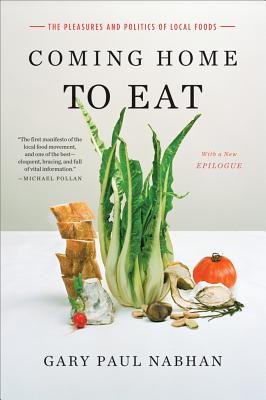

 W. W. Norton & Company
W. W. Norton & Company
Coming Home to Eat: The Pleasures and Politics of Local Food


Key Metrics
- Gary Paul Nabhan
- W. W. Norton & Company
- Paperback
- 9780393335057
- 8.1 X 5.4 X 0.9 inches
- 0.6 pounds
- Cooking > Essays & Narratives
- English
 Secure Transaction
Secure TransactionBook Description
Since Coming Home to Eat was first published in 2001, the local food movement has exploded, and more people than ever are going green in an effort to lead healthier, more eco-friendly lives. Gary Nabhan's year-long mission to eat only foods grown, fished, or gathered within 220 miles of his Arizona home offers striking and timely insights into our evolving relationship with food and place--and encourages us to redefine eating close to home as an act of deep cultural and environmental significance. As an avid gardener, ethnobotanist preserving seed diversity, and activist devoted to recovering native food traditions in the Southwest, Nabhan writes of his long campaign to raise awareness about food with contagious passion and humor.
Author Bio
Gary Nabhan, Ph.D., W.K. Kellogg Chair in Southwest Borderlands Food and Water Security, is an ethnobiologist, agroecologist, conservation biologist and cultural geographer trained at the University of Arizona and Prescott College.
He is author or editor of 26 books translated into 6 languages, a number of which have won awards. In addition to his research, teaching and community service on sustainable food systems, Nabhan farms during the summer in Patagonia, Arizona. Political Ecology of Food, Conservation Ranching and Ecosystem Services, Traditional Ecological Knowledge, Sustainable Food Systems, and Science Writing.
Current Projects: Tumamoc Hill phenology change; Sonoran Desert oasis initiative (with Susie and Paul Fish); Sabores Sin Fronteras Foodways Alliance; Stitching the West Back Together working landscapes initiative (with Tom Sheridan and Susan Charnley); biodiversity of desert oases (with Rafael Routson and Amadeo Rea); Renewing America's Food Traditions agrobiodiversity inventory (with Collaborative, American Livestock Breeds Conservancy and Western Folklife Center); climate change adaptation and agrobiodiversity (with the University of Arizona Institute for the Environment).
Source: The University of Arizona
Videos












Community reviews
Write a ReviewNo Community reviews